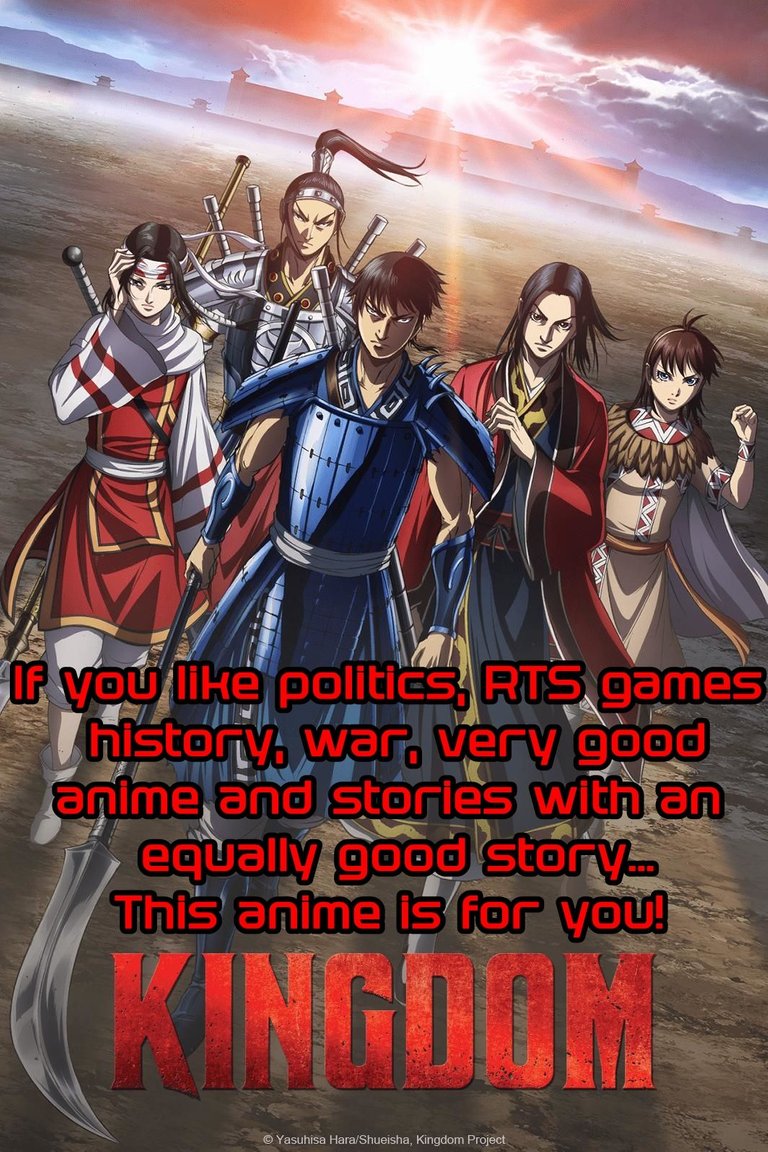
Attention! There are spoilers in the text! Finally, season 4 ended, so I could start a few hours of orgy filled to the brim with various emotions, action and content. I don't know how the author of "Kingdom" is able to maintain such a high level for so long - from the moment we saw the first battle (which was around the 10th or 14th episode of season 1), his quality only increases. So far, there was only one stumble, but it was fully justified - we needed a longer break after such an exciting arc, from which they cut quite a lot anyway (that's what my friend Rafał says, who follows the comic on a regular basis). I used to think there was nothing wrong with that, but after watching "The Last Jedi" and some other examples of this type (I mean, TLJ had a lot of emotional scenes in a few moments in the last act of the movie, which was a bit tiresome and after 2.3 such scenes, I didn't have this "energy" anymore), but now I know that you can overdo it. In addition, the creator also needs to breathe - creating such an arc was not an easy task. Just as before I wasn't quite sure if I could put this title next to Emperors of the battle-shounen genre (or a title where fighting, self-development, etc. play an important role), now I see that there is no reason to be ashamed and no problem I can put it between "One Piece" and "Fullmetal Alchemist".
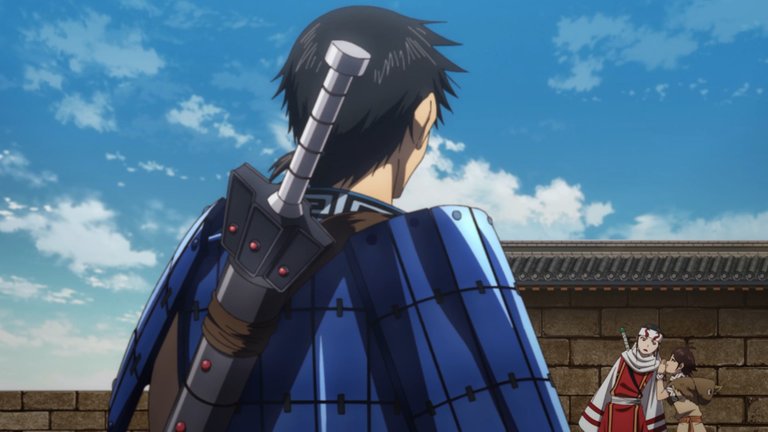
Let me start with what I promised you in one of the last mini-posts on the blog. Recently, I talked to Rafał several times about "Kingdom". There were many topics and they were different, but I will tell you about only one of them. As I have already written in previous texts, this is a title adapting real events. I do not know how faithfully the author reflects it, but after a very cursory acquaintance with it (I advise against checking it on your own, unless you are not afraid of spoilers), it seems to me that it is a similar case to the first 3 seasons of "Vikings". Yes, only the first one reflected the reality of those times very well (not my opinion, practically every historian - whether professional or passionate - whose opinion I listened to says the same thing), and each subsequent one went more and more towards fantasy. I wouldn't be surprised if it's the same with this comic - we take historical events and characters and modify them a bit to make the story more interesting. As my other friend, this time a historian, said (and he's fucking smart and intelligent, I'm bad at many topics) - "If the creators of historical series were guided only by historical realism, these series would not sell. Because they would be disgusting boring - whether it's for professionals who know these stories or viewers. The point is that everything was less dynamic and slow pacing would have been a nuisance. To sum up, "Story is the Queen", as Andrzej Sapkowski said before the premiere of season 1 of Netflix's "The Witcher".
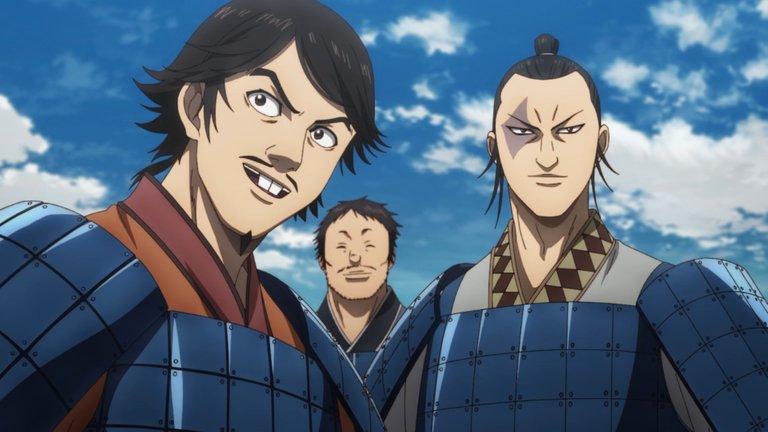
In season 4 we got 4 arks, although in fact it felt like there were only 2 - Fire Dragons of Wei and Coronation. I don't know if the author clearly separated them in the comic, but in the anime they gave the impression that they were connected - the smaller arc was combined with the larger one. I don't know if that's how the author presented it in his comic book, but watching the anime, I got the impression that he put Shin in the background and focused on side characters. I mean this spearman, who is a kind of Vegeta from the time of events on Namek in this universe, the mother of El-Sei and other heroes who are not the most important, i.e. constantly in the middle of the intrigue (Lu Buwei, for example). Some got a longer subplot and others came in for a short while (that old commander who had a similar approach to his army, like Ou Ki or the queen of the mountain people). It was very useful to me, because during the 3rd season we didn't get much chance to see them. And let's face it, this title is gigantic, probably even bigger and more complex than LotGH, and I can certainly compare it to OP. Sometimes you have to give up the protagonist or give him a minimal role so that others have the opportunity to show themselves. By the way, the author of "Kingdom" probably controls his world and the airtime he gives his characters even better than Eiichiro Oda. Yes, Yasuhisa Hara made his task easier, because his characters are not so closely connected to each other (I think so, I know what I want to say, but I can't put it into words), but on the other hand, he can write them more concretely. I don't get the impression (as in OP) that some heroes and heroines are ignored (relatively, the author diminishes their role and devotes too little time to them) in favor of other, more important characters or events. Even if a character has a minimal role in a given plot, IMO it is better remembered - not only because of the pace of the action, but also because of the proper writing and presentation of its part of the script. Well, the pace - in this respect, nothing has changed. Pierrot balanced the pacing perfectly. The action is very dynamic, but not galloping like a marathon runner (see some episodes from the 2nd half of the 3rd arc "Jojo's Bizzare Adventure"). Other anime creators can learn from them.
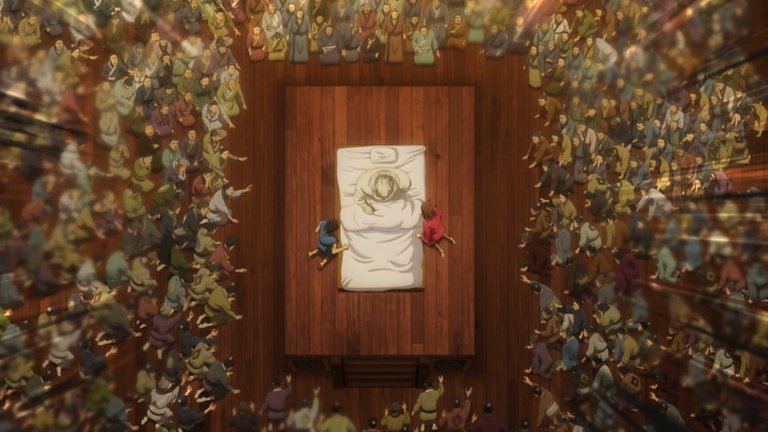
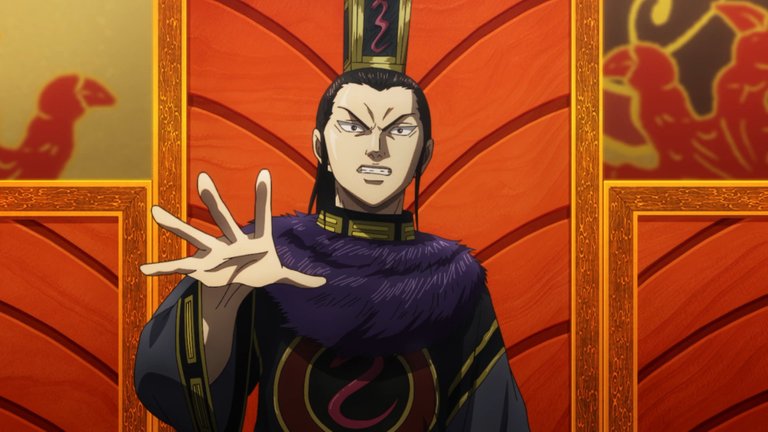
Before moving on to the next part, I will write briefly about Ou Ki, the brother of the King - Sei Kyou, the chancellor, and someone else. When Rafał told me that the prince would get his "redemption arc", I knew it would be a strong plot, but I didn't expect to get something at the level of the scene from the final stage, when he said to the Chancellor more or less: "Fuck off from throne, you filthy swine. You will never put your disgusting and fake ass on it." You can see that El Sei had a gigantic influence on him. He's still an asshole, but he knows how to control his toxic traits and use them when necessary (e.g. during conversations, checking people), but more often he keeps silent and observes, speaking when he can add something important from himself. When he stayed to defend his woman and her dignity, I couldn't stop crying because I knew how it would end. I was deluding myself that it would be a case like in a worse comic book, that they would suddenly save a hero who would surely die... Well, half jokingly, half seriously, that's how you can tell a good comic book creator from a worse one - how his character is supposed to die, it will die, not be saved suddenly at the last moment. One of the best hero sacrifices I've ever seen in an anime. As for Shin's mentor, it will be short. Again I will refer to the OP, this time the Mihawk vs Zoro fight. This duel was almost at the very beginning of the story, and yet, Mihawk still makes a big impression, even though in many cases, these types of characters lose power levels as the story progresses (or should I say, the others catch up and overtake him too quickly) . With Ou Ki it's different - flashbacks develop it very well. We see how opponents of Shin and others (but mainly them) relate to the deceased General. As they emphasize his power or the author himself does it - the scene with the giant who had several 6-packs on his belly (I'm not kidding, it looks funny XD) stuck in my memory the most. It was explicitly stated that these experienced commanders did not fight him because they might die, so why risk it senselessly? Commander Qin was also afraid (why am I not surprised, the difference in strength is not too high, and victory or defeat consists of several or a dozen factors, often it is not so simple that "he was just stronger" or "he was better off" prepared for the fight), but he also knew what he was capable of and would rather win, as evidenced by his smirk in this situation. in both cases, I rely on the opinion of experts who know the subject much better than I do - he will master one strike, sequence or in some situations, tactics to perfection, engaging in this one attack the strength of all his muscles, momentum, the strength of emotions, character, etc.), only that as you grow up, you get weaker and have less and less vitality for such a risky attack, and you also know that it uses up more and more stamina, and one hit isn't always enough... What then? that the Doom Lips will be they appeared more often in "Kingdom", because I miss this character so much. Especially when I see his greatness and remember his artistic sensibility for art... He was talented not only in the war craft, haha.
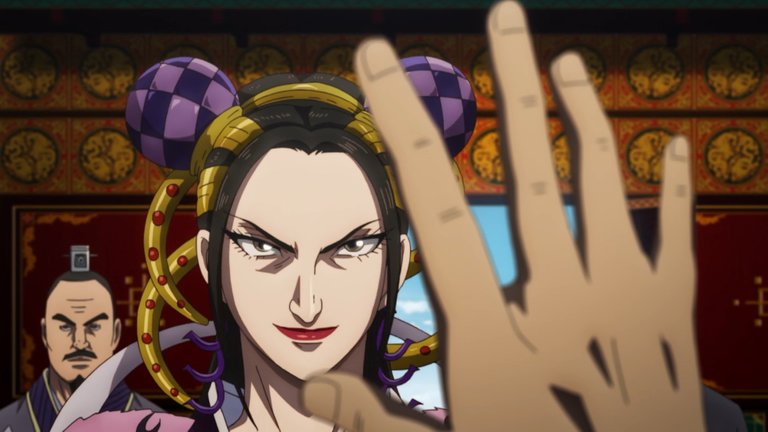
The third person I would like to single out is the Queen Mother. But I'll start with something else - I'm very happy that Pierrot is censoring "Kingdom" less and less. Just like in the 1st and 2nd seasons I had to add a bit (and as I later found out, even from the 3rd and 4th season, most of my interpretations were accurate), so here we get a lot of things shown directly. Such censorship is enough for me - I don't need to see Lao Ai (the Queen's husband) being torn to pieces by 4 horses, I don't need to see other killing blows that spurt blood like from a fountain, or the Queen jumping on her naked lover who has been extremely generously endowed by nature - a clear outline of these scenes is quite enough for me. Whenever El Sei's mother is relevant to a plot, it feels like it was written by Ai Yazawa ("Nana"), Hiromu Arakawa (FMA) or Tsukasa Hojo ("City Hunter"). I like these titles for many things, but one of my favorite advantages is showing the characters and their emotions realistically. Let me be clear - the point is that their reactions are not exaggerated and are consistent with their previous experiences (and everything that psychology deals with). The queen, although she secured her existence (against the coup d'état and before her ambitions grew so large that she decided to spit on her son's dignity by founding a state in his kingdom), did not heal the wounds of her soul. He still tries to pretend to everyone that he's doing well, even though he hides it as effectively as a small child hiding garbage under the carpet, pretending that he doesn't know anything. She put on the mask of a strong and independent woman, but at the end of the day, when she locks herself in her chamber and begins to de-stress in a pleasant way, after a short pleasure, she begins to cry over her fate. The chancellor does not even have to try to provoke her effectively - one simple text was enough to evoke a specific reaction in her. She is so thoroughly frustrated and scarred that even in the face of death, when she should be fighting for her (and her children's) life, she prefers to spit on her son and slander him while blaming all her life's failures. At the same time, she is very intelligent and able to adapt to the situation, as evidenced by the moment she agreed to rebel. She had no alternative, this one would have happened anyway. I know that some of you have probably noticed the inconsistency - she can adapt, but is she choleric at the same time? So I answer - yes, she is emotionally unstable and sometimes she is not able to adapt, but as long as she is not in an extreme situation, when emotions take over logic, it does not cause her an outstanding problem. Basically, it's like Cersei, only better executed in my opinion. In turn, the author of "Kingdom", matched the level of the previously mentioned creators. I didn't expect that in a series based so much on combat, I would get so many great emotions.
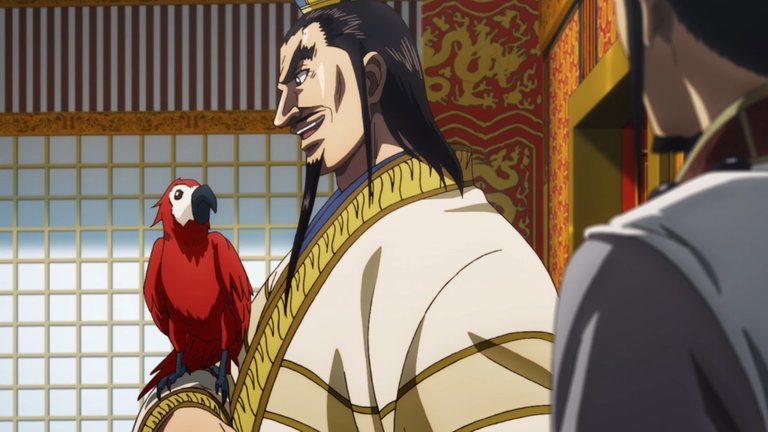
That's right, Chancellor. He is an excellent politician, a master of eristics, a master of peace, a man who can juggle between flowery and flexible speech for intellectuals and hard and strong slogans that simple people and the army will understand, as well as he can read the desires of ordinary people and manipulate them. He is a man who with monkey dexterity can adapt to any situation, no matter if it's good or bad. For him or for others. I could go on like this, but it's a waste of space, so I'll sum it up in one sentence. As Vladimir Lenin is said to have said, "The capitalists will sell us the string with which we will hang them." It's hard to come to a different conclusion when we see flashbacks in which Lu Buwei realized what he wanted to do in life and how he could become the ruler of the state. Like the archenemy in Season 3, the Chancellor has been planning this moment for many years, and even longer than he did. Proof - the queen mother he met long ago and disgustingly manipulated by exploiting a woman's sensitivity to emotions. We could see the announcement of these events already in the first season, when the author of the comic informed us about his plans through his internal dialogue. Like Ri Boku (or Vilgefortz from The Witcher, in a way they are similar cases - they had to act carefully, plan everything carefully), he gradually implemented it, step by step, without arousing suspicion in his political opponents. He created a show that provided him with effective fog of war (an area invisible to us, a place where we do not have verified information and cannot obtain it in any way) and hid the overwhelming majority of his movements. In fact, he created several shows - one for the people in the palace, one for his own people and the pawns he used (so that his plans or inconvenient information wouldn't leak to his opponents), the people who followed him, the simple peasants and the inhabitants of the capital . And each of them was successful. I hope we won't say goodbye to him soon, because although I have similar feelings for him as for our politicians like him (even though they don't have even 1/10 of his charisma, strength of character and inner power), at the same time he gives me he is a great joy. A cynical to the core son of a bitch who never loses his temper even when under enormous pressure and lies like a dog so that not a single eyebrow hair twitches. Not only that, he is an extremely intelligent and unforgiving person who will plan and implement everything so that his opponents have a big problem. Nor would he hesitate to use someone else's words against their authors, which was just as much of a worry for the King.
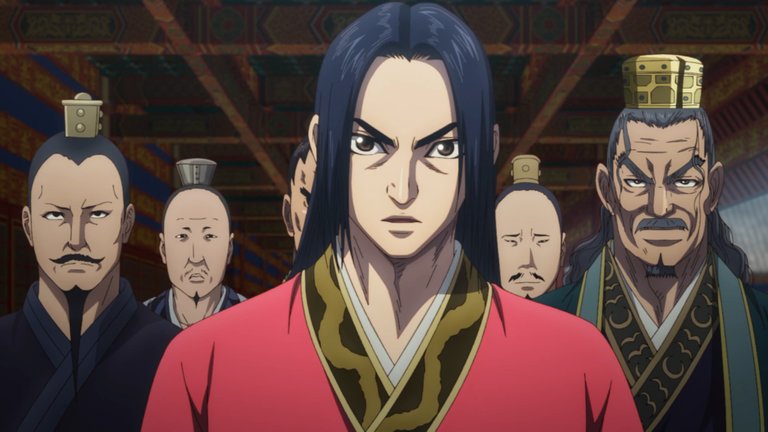
One of the highlights of this season was the conversation between the chancellor and the newly crowned El Sei. A beautiful and very substantive debate in which two powerful and influential figures clashed. It was difficult for me to point out a clear winner in it, because each side had valid arguments. Two ideas that will give poor people a better life. Two ideas that may or may not work. Rafał and I discussed this scene and we both agreed that no other shounen of this type (or seinen) has scenes like this. Yes, they are comparably strong, but they are much shorter and less substantial. Their verbal skirmish, if all the elements that interrupted it were cut out, would last 1.5 episodes or one episode. As you can see, there is such a big difference between them that it is impossible to compare them fairly. If I had commented on this conversation a few years ago, I would have chosen Lu Buwei's version, who speaks like a hard-core free-market liberal, considering money to be the basis of everything. I agree with him, I've even argued many times myself why money is the basis of everything and should be the starting point of the conversation on almost every important matter. However, I understood that this is a wrong perspective - thanks to Karol, Rafał and one coach who is active on YT. Developing only in one direction, we ignore the others, and finance alone will not provide us with security in other aspects. If that's how we act as an individual, well, that's her risk. In the case of the state, it works differently - due to its size, it suffers from a kind of inertia. It reacts with a delay, it does not see some problems, it is more difficult for it to identify them, which makes it more vulnerable to various attacks. Let's pretend for a moment that the chancellor isn't a cynical dick who can talk beautifully, but when it comes to action, he doesn't give a shit about other people and is driven only by his own profit (there's nothing wrong with that, but he totally exaggerates). A rich country is a temptation for neighbors, and they could get along, as in season 3, and gradually destroy Qin. After all, nothing unites like a common enemy. Let's also not forget that free-market reforms without strong bureaucratic power will not make the country a liberal paradise, such as England, but a state like Russia - that is, an oligarchy. Internal factors are also important - after all, already in this anime, politicians understood how the influence agency works and what can be done with it, provided that you have enough resources. Besides, as El Sei rightly pointed out after this conversation (because he couldn't say it during the conversation, he would have given his opponent an argument) - the country will last a maximum of 15 years during the state of emergency. Then it will crash - either by internal factors, external factors or a mix of both. Therefore, the king cannot be guided by only one indicator, his responsibility is too high, and the consequences are too dangerous.
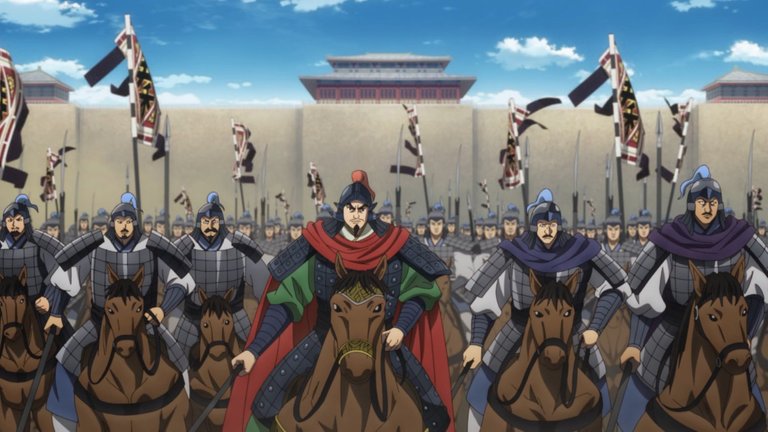
The second highlight was the coronation. It made a huge impression on me, you can see the difference in the level of civilization. Out of curiosity, I did research and checked in Google (+ I asked a friend who understands this topic) what Europe looked like then. At that time, only the Greeks and Romans were on a similar level (I don't go into details, I don't know much about history), when it comes to the strength of culture, the level of advancement of civilization, medicine, science, military strength. The rest are Celts and many other peoples, such as Slavs, Germans, Scandinavians. Don't get me wrong, I'm not criticizing other nations because we really don't know much about them. They didn't develop literature and communication like we did. They were also more stingy when it came to leaving information for posterity (if I remember correctly, I could be wrong here). This does not mean that they were savages (although I admit to ignorance, I did not remember these things from my school days and I was quite wrong when I advertised this anime in an entry from a week or two ago). Nevertheless, assuming that the manga author does his work diligently and faithfully reflects the China of that time (and I have no reason to believe otherwise), our ancestors of that time were smaller than China at that time. Maybe it's my ignorance, but it seems to me that European civilizations were less developed. This was well seen during the coronation and when observing the city of Xianyang from the perspective of the warriors of both sides. The majesty of the king was shown very well, which was additionally enhanced thanks to the throne room - his person was emphasized with light and clothes (I don't know if it was clothing intended specifically for this ceremony, but it emphasized the light coming through the windows even more. As for the anime, it has not yet been I've seen a coronation shown so epic, I hope when the king changes his title to Emperor it will be an even more epic event.
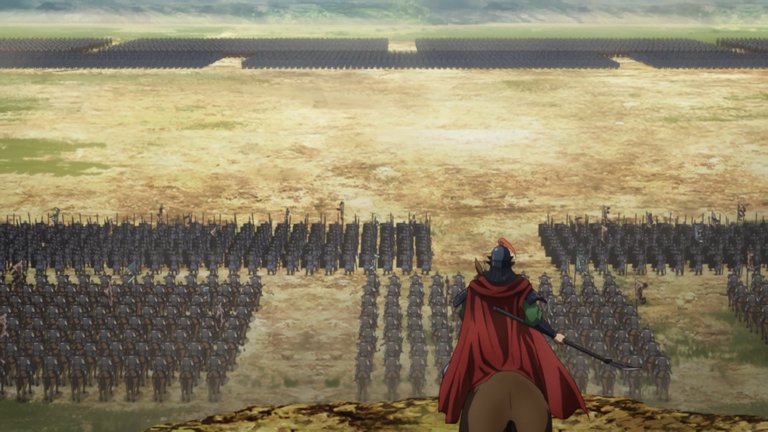
When it comes to the audio-visual sphere, I don't have much to say. The art, the animation, the CGI, it gets better every season. Already in the review of season 3 I wrote that "Kingdom" has no reason to be ashamed, and after watching season 4, I can repeat these words. Sure, you can see the repetition of animations etc. but I will defend the creators, because they have a lot to draw and animate. If only because it is not a repetition on a level to which we have become accustomed, for example, to "Dragon Ball". I don't know if I can say the same about the soundtrack, but it was the most pleasant listening to it so far. Both while writing this review and during the anime. I even turned on the playlist a few times while driving or as an alternative background music for playing RTS. It's not an outstanding soundtrack, I miss some unique tracks that would be characteristic of this anime, but ... It emphasizes the chaos and dynamic nature of the fights very well, and it's equally well made. Anyway, not only in them - this OST, although I don't associate it with China from those times, works surprisingly well as a background. I liked both openings, although to be honest, I liked the second one only towards the end. At first I complained about it, but it was enough to get used to it - it fits the vibe and is a good song. The endings were also ok, but the ones from the previous seasons, if I remember correctly, I liked them better.
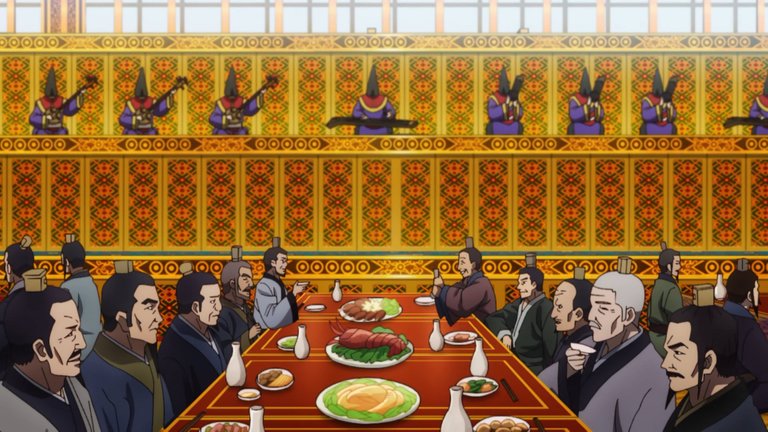
All in all, we got another great anime. I still think season 3 is the best, but that's only because the plot was better. i.e. more exciting, more things happened, and the characters had more epic scenes. And I mean 2 arc, the one from the first half of the anime I don't take into account in my assessment. As I wrote, we needed a moment of respite between one event and another. My rating is +8/10, because I gave season 3 9/10.
Thank you for helping Rafał.
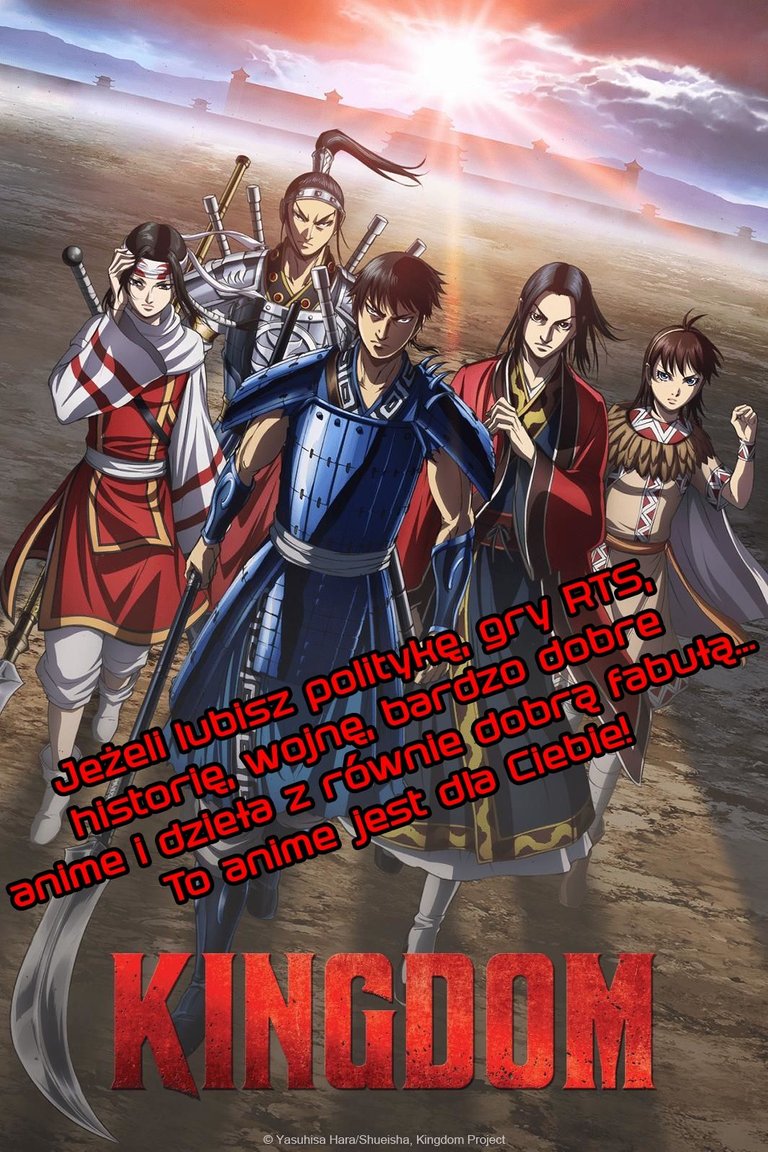
Uwaga! W tekście są spoilery! W końcu skończył się 4 sezon, więc mogłem zacząć kilkugodzinną orgię wypełnioną po brzegi różnymi emocjami, akcją i treścią. Nie wiem jakim cudem autor "Kingdom", jest w stanie utrzymać tak długo, tak wysoki poziom - od momentu, gdy zobaczyliśmy pierwszą bitwę (co było w okolicach 10 lub 14 odcinka 1 sezonu), to jego jakość tylko rośnie. Póki co było tylko jedno potknięcie, ale było ono w pełni uzasadnione - potrzebowaliśmy dłuższej chwili na przerwę po tak emocjonującym arcu, z którego i tak dość dużo wycięli (tak twierdzi mój kolega Rafał, który na bieżąco śledzi komiks). Kiedyś myślałem, że nie ma w tym nic złego, ale po obejrzeniu "The Last Jedi" i paru innych przykładów tego typu (chodzi o to, że TLJ w kilku momentach z ostatniego aktu filmu, miał dużo emocjonalnych scen, co było trochę męczące i po 2,3 takich scenach, nie miałem już tej "energii"), ale teraz wiem, że można z tym przesadzić. Poza tym, twórca też musi odetchnąć - tworzenie takiego arcu nie należało do łatwych zadań. Tak jak wcześniej nie byłem do końca pewien, czy mogę stawiać ten tytuł obok Cesarzy gatunku battle-shounen (lub tytułu, w którym walki, samorozwój etc. pełnią istotną rolę), tak teraz widzę, że nie ma żadnych powodów do wstydu i bez problemu mogę go postawić pomiędzy "One Piece" i "Fullmetal Alchemist".

Zacznę może od tego, co obiecałem Wam przy jednym z ostatnich mini-wpisów na blogu. Niedawno temu kilkakrotnie rozmawiałem z Rafałem o "Kingdom". Tematów było wiele i były one różne, ale powiem Wam tylko o jednym z nich. Jak już pisałem w poprzednich tekstach, to tytuł adaptujący prawdziwe wydarzenia. Nie wiem, na ile autor wiernie ją oddaje, ale po bardzo pobieżnym zapoznaniu się z nią (odradzam sprawdzanie na własną rękę, chyba że nie boicie się spoilerów), to wydaje mi się, że to podobny casus do pierwszych 3 sezonów "Vikings". Tak, tylko pierwszy bardzo dobrze oddawał realia tamtych czasów (nie moja opinia, praktycznie każdy historyk - czy to zawodowy, czy pasjonat - którego opinii wysłuchałem, mówi to samo), a każdy kolejny szedł coraz bardziej w kierunku fantasy. Nie zdziwiłbym się, gdyby w przypadku tego komiksu było podobnie - bierzemy wydarzenia i postacie historyczne, które nieco modyfikujemy, aby opowieść była ciekawsza. Jak to powiedział mój inny znajomy, tym razem historyk (i to kurewsko mądry i inteligentny, jestem przy nim marny w wielu tematach) - "Gdyby twórcy seriali historycznych, kierowali się tylko realizmem historycznym, to te seriale by się nie sprzedały. Bo byłyby obrzydliwie nudne - czy to dla specjalistów, którzy znają te historie, czy widzów.". Chodzi o to, że wszystko działo się mniej dynamicznie i powolny pacing na pewno by przeszkadzał. Reasumując, "Story is the Queen", jak to powiedział Andrzej Sapkowski przed premierą 1 sezonu Netflixowego "Wiedźmina".

W 4 sezonie dostaliśmy 4 arce, choć tak na dobrą sprawę, to czułem jakby były tylko 2 - Fire Dragons of Wei i Koronacja. Nie wiem, czy autor je wyraźnie oddzielił w komiksie, ale w anime sprawiały wrażenie, jakby zostały połączone - mniejszy arc zespolono z większym. Nie wiem, czy tak to przedstawił autor w swoim komiksie, ale oglądając anime, odniosłem wrażenie, jakby odstawił Shina na drugi plan i skupił się na postaciach pobocznych. Mam tu na myśli tego włócznika, który jest takim Vegetą z czasu wydarzeń na Namek w tym uniwersum, matkę El-Seia i innych bohaterów, którzy nie należą do tych najważniejszych, tj. cały czas będących w środku intrygi (Lu Buwei np.). Niektóre dostały dłuższy wątek, a inne pojawiły się na krótką chwilę (ten stary dowódca, który miał podobne podejście do swojej armii, jak Ou Ki lub królowa ludzi z gór). Bardzo mi się to przydało, bo w trakcie 3 sezonu nie mieliśmy zbyt wielu okazji, by ich zobaczyć. No i nie oszukujmy się, ten tytuł jest gigantyczny, chyba jeszcze większy i bardziej złożony niż LotGH, a na pewno mogę go porównać do OP. Czasem trzeba zrezygnować z protagonisty lub dać mu minimalną rolę, by inni mieli okazję do pokazania się. Swoją drogą, autor "Kingdom" chyba jeszcze lepiej kontroluje swój świat i czas antenowy, jaki daje swoim bohaterom niż Eiichiro Oda. Tak, Yasuhisa Hara ułatwił sobie zadanie, bo jego postacie nie są aż tak ściśle ze sobą połączone (tak mi się wydaje, wiem co chcę powiedzieć, ale nie umiem tego ubrać w słowa), ale z drugiej strony, potrafi je napisać bardziej konkretnie. Nie odnoszę takiego wrażenia (jak w OP), że niektórzy bohaterowie i bohaterki są ignorowani (względnie, autor umniejsza ich rolę i poświęca im za mało czasu) na rzecz innych, ważniejszych postaci lub wydarzeń. Nawet jeżeli jakaś postać ma minimalną rolę w danym wątku, to IMO lepiej zapada w pamięci - nie tylko ze względu na tempo akcji, ale również porządne napisanie i przedstawienie jej części scenariusza. No właśnie, tempo - pod tym względem nic się nie zmieniło. Pierrot idealnie wyważył pacing. Akcja jest bardzo dynamiczna, ale nie galopuje, jak maratończyk (patrz niektóre odcinki z 2 połowy 3 arcu "Jojo's Bizzare Adventure"). Inni twórcy anime mogą się od nich uczyć.


Zanim przejdę do kolejnej części, to napiszę krótko o Ou Ki, bracie Króla - Sei Kyou, kanclerzu i kimś jeszcze. Gdy Rafał mi mówił, że książe dostanie swój "redemption arc", to wiedziałem, że będzie to mocny wątek, ale nie spodziewałem się, że dostanę coś na poziomie sceny z finałowego etapu, gdy powiedział do Kanclerza mniej więcej to: "Odpierdol się od tronu, ty brudna świnio. Nigdy nie postawisz na nim swojej obrzydliwej i fałszywej dupy.". Widać, że El Sei miał na niego gigantyczny wpływ. Nadal jest dupkiem, ale umie już kontrolować swoje toksyczne cechy i korzystać z nich, kiedy jest to niezbędne (np. podczas rozmów, sprawdzania ludzi), ale częściej milczy i obserwuje, wypowiadając się wtedy, gdy może dodać coś istotnego od siebie. Gdy został, by bronić swojej kobiety i jej godności, to nie mogłem powstrzymać łez, bo wiedziałem jak to się skończy. Łudziłem się, że to będzie ten przypadek, jak w gorszym komiksie, że nagle uratują bohatera, który na pewno umrze... No cóż, mówiąc pół żartem pół serio, tak można odróżnić dobrego twórcę komiksu od gorszego - jak jego postać ma umrzeć, to umrze, a nie uratuje się nagle w ostatnim momencie. Jedno z najlepszych poświęceń bohatera, jakie widziałem kiedykolwiek w anime. Jeśli chodzi o mentora Shina, to będzie krótko. Znowu odwołam się do OP, tym razem walki Mihawk vs Zoro. Ten pojedynek był niemal na samym początku historii, a mimo to, Mihawk nadal robi duże wrażenie, mimo że w wielu przypadkach, tego typu postacie tracą power level w trakcie rozwoju fabuły (czy raczej powinienem był powiedzieć, inni zbyt szybko go doganiają i przeganiają). Z Ou Ki jest inaczej - retrospekcje bardzo dobrze go rozwijają. Widzimy, jak przeciwnicy Shina i nie tylko (choć przede wszystkim oni), odnoszą się do zmarłego Generała. Jak podkreślają jego potęgę lub robi to sam autor - najbardziej utkwiła mi w pamięci scena z tym olbrzymem, który miał kilka 6-paków na brzuchu (nie żartuję, wygląda to komicznie XD). Zostało wprost powiedziane, że ci doświadczeni dowódcy nie walczyli z nim, bo mogliby umrzeć, zatem po co bezsensownie ryzykować? Dowódca Qin też się bał (czemu się nie dziwię, różnica w sile nie jest zbyt wysoka, a na zwycięstwo lub klęskę, zbiera się kilka lub kilkanaście czynników, często to nie jest takie proste, że "był po prostu silniejszy" lub "lepiej się przygotował do walki), ale wiedział też, do czego jest zdolny i raczej by wygrał, o czym świadczy jego uśmieszek w tej sytuacji. Wie, że jedna skuteczna szarża, którą dopracuje do perfekcji (jak Japońscy samuraje, czy gracze e-sportowi - w obu przypadkach opieram się na opinii ekspertów, którzy znają temat znacznie lepiej niż ja - opanuje do perfekcji jeden cios, sekwencję lub w niektórych sytuacjach, taktykę, angażując w ten jeden atak siłę wszystkich swoich mięśni, momentum, siłę emocji, charakteru etc.), może ich zmieść... Tylko, że wraz z dojrzewaniem, człowiek słabnie i ma coraz mniej sił witalnych na taki ryzykowny atak. Wie też, że zużywa on coraz więcej staminy, a nie zawsze jeden cios wystarczy... Co wtedy? Mam nadzieję, że Wargi Zagłady będą się częściej pojawiały w "Kingdom", bo bardzo mi brakuje tej postaci. Zwłaszcza, gdy widzę jego wielkość i przypomnę sobie jego artystyczną wrażliwość na sztukę... Był utalentowany nie tylko w wojennym rzemiośle, haha.

Trzecią osobą, którą chciałbym wyróżnić, jest królowa matka. Zacznę jednak od czegoś innego - bardzo mnie cieszy to, że Pierrot coraz mniej cenzuruje "Kingdom". Tak jak w 1 i 2 sezonie musiałem sobie trochę dopowiadać (i jak się potem dowiedziałem, choćby z 3 i 4 sezonu, większość z moich interpretacji była trafna), tak tutaj dostajemy wiele rzeczy pokazanych wprost. Taka cenzura mi w zupełności wystarczy - nie muszę widzieć, jak Lao Ai (mąż królowej) jest rozerwany na kawałki przez 4 konie, nie muszę widzieć innych, zabójczych ciosów, po których krew tryska, jak z fontanny, czy jak Królowa skacze po swoim nagim kochanku, który został niezwykle hojnie obdarzony przez naturę - wyraźne zarysowanie tych scen mi w zupełności wystarczy. Za każdym razem, gdy matka El Seia ma istotne znaczenie dla danego wątku, to czuję się jakby została napisana przez Ai Yazawa ("Nana"), Hiromu Arakawa (FMA) lub Tsukasa Hojo ("City Hunter"). Lubię te tytuły za wiele rzeczy, ale jedną z moich ulubionych zalet, jest realne pokazywanie postaci i ich emocji. Żebym został dobrze zrozumiany - chodzi o to, że ich reakcje nie są przerysowane i są zgodne z ich wcześniejszymi doświadczeniami (oraz wszystkim tym, czym zajmuje się psychologia). Królowa, mimo że zabezpieczyła swój byt (przed zamachem stanu i zanim jej ambicje tak urosły, że zdecydowała się napluć na godność swojego syna, zakładając państwo na terenie jego królestwa), to nie wyleczyła ran swojej duszy. Nadal próbuje przed wszystkimi udawać, że dobrze sobie radzi, mimo że ukrywa to równie skutecznie, co małe dziecko chowające śmieci pod dywanem, udając że o niczym nie wie. Założyła na siebie maskę silnej i niezależnej kobiety, ale na koniec dnia, gdy zamyka się w swojej komnacie i zaczyna się odstresowywać w przyjemny sposób, to po krótkiej przyjemności, zaczyna płakać nad swym losem. Kanclerz nawet nie musi się starać, by ją skutecznie sprowokować - wystarczył jeden prosty tekst, by wywołać w niej określoną reakcję. Jest tak dogłębnie sfrustrowana i okaleczona, że nawet w obliczu śmierci, gdy powinna walczyć o swoje (i swoich dzieci) życie, woli pluć na syna i szkalować go, jednocześnie obwiniając o swoje wszystkie, życiowe niepowodzenia. Jednocześnie jest bardzo inteligentna i potrafi dostosować się do sytuacji, o czym świadczy moment, w którym zgodziła się na bunt. Nie miała alternatywy, ten tak czy inaczej by się odbył. Wiem, że pewnie niektórzy z Was dostrzegli niespójność - potrafi się dostosować, ale jest jednocześnie choleryczką? Zatem odpowiadam - tak, jest niestabilna emocjonalnie i czasem nie jest się w stanie dostosować, ale dopóki nie jest w sytuacji ekstremalnej, gdy władzę nad logiką przejmują emocje, to nie sprawia jej to wybitnego problemu. Generalnie to taka Cersei, tylko że moim zdaniem lepiej poprowadzona. Z kolei autor "Kingdom", dorównał poziomowi wcześniej wspomnianych twórców. Nie spodziewałem się, że w serii opierającej się w tak dużym stopniu na walce, dostanę tyle świetnych emocji.

No właśnie, kanclerz. Jest to doskonały polityk, mistrz erystyki, arcymistrz spokoju, człowiek który potrafi żonglować między kwiecistą i giętką mową dla intelektualistów, a twardymi i mocnymi hasłami, które zrozumieją prości ludzie i wojsko, jak również potrafi odczytać pragnienia zwykłych ludzi i ich zmanipulować. Jest to człowiek, który z małpią zręcznością potrafi dostosować się do każdej sytuacji, nie ważne czy złej, czy dobrej. Dla niego lub dla innych. Mogę tak mówić dalej, ale szkoda miejsca, więc podsumuję to jednym zdaniem. Jak to podobno powiedział Włodzimierz Lenin - "Kapitaliści sprzedadzą nam sznurek na którym ich powiesimy." Trudno o inne wnioski, gdy zobaczymy retrospekcje, w których Lu Buwei zrozumiał, co chce robić w życiu i jak może zostać władcą państwa. Podobnie jak główny wróg w 3 sezonie, kanclerz planował ten moment przez wiele lat, a nawet jeszcze dłużej niż on. Dowód - królowa matka, którą poznał dawno temu i obrzydliwie zmanipulował, wykorzystując kobiecą wrażliwość na emocje. Mogliśmy zobaczyć zapowiedź tych wydarzeń już w bodajże pierwszym sezonie, gdy autor komiksu informował nas o jego planach poprzez jego dialog wewnętrzny. Podobnie jak Ri Boku (lub Vilgefortz z "Wiedźmina", w pewnym sensie są to podobne przypadki - musieli działać rozważnie, dokładnie wszystko zaplanować), stopniowo go wprowadzał w życie, krok po kroku, bez wzbudzania podejrzliwości u swoich politycznych przeciwników. Stworzył show, które zapewniło mu skuteczne fog of war (obszar niewidoczny dla nas, miejsce gdzie nie mamy sprawdzonych informacji i nie możemy ich w żaden sposób uzyskać) i ukryło miażdżącą większość jego ruchów. A w zasadzie to stworzył kilka show - to przeznaczone dla ludzi w pałacu, to przeznaczone dla jego własnych ludzi i pionków, które wykorzystywał (by przypadkiem jego plany lub niewygodne informacje nie wyfrunęły do przeciwników), ludzi go śledzących, dla prostych wieśniaków i mieszkańców stolicy. I każde z nich osiągnęło sukces. Mam nadzieję, że szybko się z nim nie pożegnamy, bo choć żywię do niego podobne uczucia, co do naszych, podobnych jemu polityków (mimo, że nie mają nawet 1/10 jego charyzmy, siły charakteru i wewnętrznej potęgi), to jednocześnie sprawia mi on olbrzymią radość. Cyniczny do szpiku kości skurwysyn, który nigdy nie traci animuszu, nawet jak jest pod olbrzymią presją i łże jak pies, tak że nawet pojedynczy włos na brwi mu nie drgnie. Mało tego, to wybitnie inteligentna i pamiętliwa osoba, która tak wszystko zaplanuje i zrealizuje, by jego przeciwnicy mieli duży problem. Nie zawaha się też użyć cudzych słów przeciw ich autorom, co było równie dużym zmartwieniem dla Króla.

Jednym z highlightów tego sezonu, była rozmowa między kanclerzem, a świeżo koronowanym El Seiem. Przepiękna i bardzo merytoryczna debata, w której ścierały się dwie potężne i wpływowe postacie. Trudno było mi wskazać w niej jednoznacznego zwycięzcę, bo każda ze stron miała słuszne argumenty. Dwie idee, które zapewnią biednym ludziom lepsze życie. Dwie idee, które mogą się udać, jak i nie udać się. Dyskutowaliśmy z Rafałem o tej scenie i obaj się zgodziliśmy co do tego, że żaden inny shounen tego typu (lub seinen) nie ma takich scen. Owszem, są porównywalnie mocne, ale są one dużo krótsze i mniej treściwe. Ich potyczka słowna, gdyby wyciąć wszystkie elementy, które ją przerywały, trwałaby 1.5 odcinka lub jeden odcinek. Jak sami widzicie, jest między nimi tak duża różnica, że nie da się ich uczciwie porównać. Gdybym komentował tę rozmowę kilka lat temu, to wybrałbym wersję Lu Buweia, który wypowiada się jak twardy wolnorynkowy liberał, uważając pieniądze za podstawę wszystkiego. Zgadzam się z nim, nawet sam wielokrotnie argumentowałem, dlaczego pieniądze są podstawą wszystkiego i to od nich się powinno zaczynać rozmowę przy niemal każdej istotnej sprawie. Zrozumiałem jednak, że jest to błędna perspektywa - dzięki Karolowi, Rafałowi i jednemu coachu, który udziela się na YT. Rozwijając się tylko w jednym kierunku, pomijamy pozostałe, a same finanse nie zapewnią nam bezpieczeństwa w innych aspektach. Jeżeli tak działamy jako jednostka, to cóż - to jej ryzyko. W przypadku państwa działa to inaczej - z racji swoich gabarytów, cierpi na swoisty bezwład. Reaguje z opóźnieniem, nie widzi niektórych problemów, trudniej mu je zidentyfikować, przez co jest bardziej podatne na różne ataki. Udajmy przez chwilę, że kanclerz nie jest cynicznym chujem, który potrafi pięknie gadać, a gdy przychodzi do działania, to ma w dupie innych ludzi i kieruje się wyłącznie własnym zyskiem (nie ma w tym nic złego, ale on totalnie przesadza). Bogate państwo stanowi pokusę dla sąsiadów, a te mogłyby się dogadać, jak w 3 sezonie i sukcesywnie niszczyć Qin. Wszakże nic tak nie jednoczy, jak wspólny wróg. Nie zapominajmy również o tym, że wolnorynkowe reformy bez silnej władzy urzędniczej, nie sprawią, że kraj stanie się liberalnym rajem, jak np. Anglia, tylko państwem jak Rosja - czyli oligarchią. Nie bez znaczenia są też czynniki wewnętrzne - przecież już w tym anime, politycy rozumieli, jak działa agentura wpływu i co można za jej pomocą zrobić, o ile posiada się odpowiednio duże zasoby. Poza tym, jak słusznie zauważył El Sei po tej rozmowie (bo w trakcie nie mógł tego powiedzieć, dałby swojemu oponentowi argument do ręki) - kraj wytrzyma maksymalnie 15 lat w trakcie stanu wyjątkowego. Potem się rozwali - albo przez czynniki wewnętrzne, zewnętrzne albo mix obu z nich. Dlatego król nie może się kierować tylko jednym wskaźnikiem, jego odpowiedzialność jest zbyt wysoka, a konsekwencje zbyt groźne.

Drugim hightlightem była koronacja. Zrobiła na mnie olbrzymie wrażenie, widać różnicę w poziomie cywilizacyjnym. Aż z ciekawości zrobiłem research i sprawdziłem w google (+ zapytałem kolegi, który ogarnia ten temat), jak wyglądała wówczas mniej więcej Europa. Wtedy na podobnym poziomie (nie wnikam w szczegóły, nie znam się na historii), jeżeli chodzi o siłę kultury, stopnia zaawansowania cywilizacji, medycyny, nauki, siły wojskowej, byli tylko Grecy i Rzymianie. Reszta to Celtowie i wiele innych ludów, jak np. Słowianie, Germanie, Skandynawowie. Nie zrozumcie mnie źle, nie krytykuję innych nacji, bo tak naprawdę niewiele o nich wiemy. Nie rozwinęli piśmiennictwa i przekazywania informacji, jak my. Byli też bardziej skąpi, jeśli chodzi o zostawianie informacji dla potomnych (o ile dobrze pamiętam, tu się mogę mylić). Nie znaczy to, że byli dzikusami (choć przyznaję się do ignorancji, nie pamiętałem tych rzeczy z czasów szkolnych i dość mocno się pomyliłem, jak reklamowałem to anime w wpisie sprzed tygodnia, czy dwóch). Niemniej, zakładając że autor mangi, wykonuje swoją pracę rzetelnie i dostatecznie wiernie oddaje Chiny tamtych czasów (a nie mam najmniejszych powodów, by twierdzić inaczej), to nasi ówcześni przodkowie byli mniejsi od Chin w tamtym momencie. Może to moja ignorancja, ale wydaje mi się, że Europejskie cywilizacje były słabiej rozwinięte. Dobrze to było widać w trakcie koronacji i podczas obserwowania miasta Xianyang z perspektywy wojowników obu stron. Bardzo dobrze pokazano majestat króla, który dodatkowo został wzmocniony dzięki sali tronowej - podkreślono jego osobę światłem oraz strojem (nie wiem, czy to odzież przeznaczona specjalnie do tej ceremonii, ale jeszcze bardziej podkreślała światło wpadające przez szyby. Jeśli chodzi o anime, to dotychczas nie widziałem, by tak epicko pokazano koronację. Mam nadzieję, że jak król zmieni swój tytuł na Cesarza, to będzie to jeszcze bardziej epickie wydarzenie.

Jeśli chodzi o sferę audio-wizualną, to nie mam zbyt wiele do powiedzenia. Kreska, animacja, CGI, jest coraz lepsze wraz z każdym sezonem. Już w recenzji 3 sezonu napisałem, że "Kingdom" nie ma już powodu do wstydu, a po obejrzeniu 4, mogę powtórzyć te słowa. Jasne, widać powtarzalność animacji etc. ale będę bronił twórców, bo mają bardzo dużo do rysowania i animowania. Choćby dlatego, że nie jest to powtarzanie na poziomie, do którego przyzwyczaił nas choćby "Dragon Ball". Nie wiem, czy to samo mogę powiedzieć o soundtracku, ale słuchało mi się go najprzyjemniej z dotychczasowych. Zarówno podczas pisania tej recenzji, czy w trakcie anime. Nawet parę razy włączyłem sobie playlistę podczas jazdy samochodem albo jako alternatywny podkład muzyczny pod granie w RTS-y. Nie jest to wybitny soundtrack, brakuje mi jakiś unikalnych utworów, które byłyby charakterystyczne dla tego anime, ale... Bardzo dobrze podkreśla chaos i dynamiczny charakter walk, no i jest równie porządnie wykonany. Zresztą, nie tylko w nich - ten OST mimo, że bynajmniej nie kojarzy mi się Chinami z tamtych czasów, to zaskakująco dobrze sprawdza się jako tło. Oba openingi mi się spodobały, choć będąc szczerym, to ten drugi spodobał mi się dopiero pod koniec. Początkowo na niego narzekałem, ale wystarczyło się przyzwyczaić - pasuje do klimatu i jest dobrą piosenką. Endingi też były ok, ale te z poprzednich sezonów, jeśli dobrze pamiętam, podobały mi się bardziej.

Reasumując, dostaliśmy kolejny świetne anime. 3 sezon nadal uważam za najlepszy, ale wynika to tylko z tego, że fabuła była lepsza. Tj. bardziej emocjonująca, działo się więcej rzeczy, a postacie miały więcej epickich scen. I mam tu na myśli 2 arc, tego z pierwszej połowy anime nie biorę pod uwagę przy swojej ocenie. Jak napisałem, potrzebowaliśmy takiej chwili wytchnienia pomiędzy jednym, a drugim wydarzeniem. Moja ocena to +8/10, bo 3 sezonowi dałem chyba 9/10.
Dziękuję za pomoc Rafałowi.